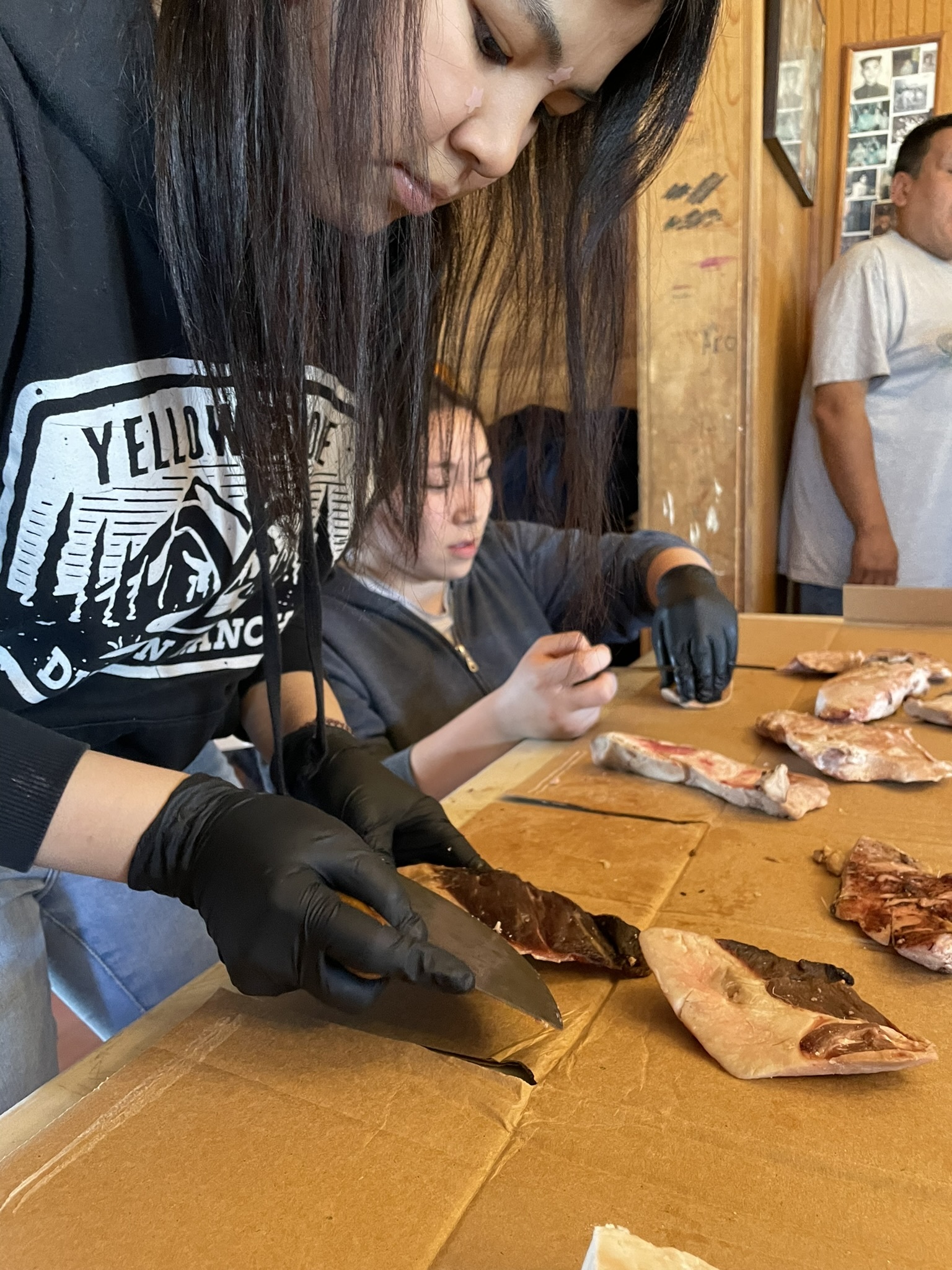
Ilakucaraq students scrape gristle off of caribou fat in Utqiaġvik. Molissa Udevitz
• August 19, 2024
As part of Gather Round, we go behind the scenes of Forum programs to illustrate our intentional and community-informed approach to our work. Our first featured entry is from Programs Design Manager Molissa Udevitz.
An Ilakucaraq teen participant exclaimed “It smells like my Auntie’s house!” as we walked into Jackie Nayakik's family home in Utqiaġvik. She was referring to the delicious yeast aroma of fresh fry bread. This was the first evening of a 5-day trip to Utqiaġvik this past June for an Ilakucaraq cohort, a program that brings rural and urban Alaska Native youth together to explore their heritages, share their cultures, and find strength in being Indigenous.
Jackie and her husband Carl invited our group of 15 teens to enjoy dinner with their whaling crew and help with preparations for Nalukataq, a community whaling festival and feast. Our students immediately felt at ease snacking on foods such as caribou soup and fry bread, playing with toddlers, and being put to work. The evening’s task was scraping gristle off chunks of caribou fat that would become the main ingredient in their akutaq. Most students were familiar with sweet, berry-filled akutaq, but this experience exposed students to a savory recipe made with caribou fat and ground caribou meat, using the available ingredients in a place where few berries grow.

Ilakucaraq students scrape gristle off of caribou fat in Utqiaġvik. Molissa Udevitz
These students came from communities across Alaska (see inset map) and had been together as an Ilakucaraq cohort for a year. They first met on a 5-day trip to Anchorage in summer 2023, stayed connected through virtual programming during the school year, and re-connected on this Utqiaġvik trip. The year-long experience allowed each cohort to become a tight-knit community that supported one another as they built confidence and traveled together to urban Anchorage and rural Utqiaġvik.
Ilakucaraq (pronounced Ee-la-cou-jaw-ga-ck) means “being together” in Yugtun, the language of the Yup’ik people. The Ilakucaraq Program (IP) embodied AKHF’s “community” core belief, bringing together students, community members, and Culture Bearers around the shared purpose of supporting Native students in developing a strong sense of belonging and self.
The work that made it possible for 15 teens to be welcomed into Jackie’s family home started the previous winter. This multi-month process consisted of emails, texts, and phone calls to find the right people interested in working with our students in the communities IP was visiting. After explaining the goals of IP, each contact was asked if they or someone they knew would like to work with our students. IP staff worked with each person to figure out what they wanted to do with the students, letting them decide what was important to share with our group. Each connection also gave us a better understanding of the community – from rural airport logistics to who could help us borrow fishing rods.
Our Utqiaġvik trip is a perfect example of the complex web of connections that led us to Jackie and Carl. The search began by talking with a former AKHF staff member, Kelly Forster, who lived in Utqiaġvik for several years. She suggested reaching out to a few individuals, including Tess Williams, who recommended connecting with her colleague, Frieda Nageak, the External Affairs Coordinator at Iḷisaġvik College. Frieda became one of IP’s greatest advocates in Utqiaġvik, telling numerous people about our visit and getting Iḷisaġvik to donate a conference room for us to use as a meeting space. Frieda is how we ultimately got connected to Jackie and Carl, who served as our hosts and spent time with our group each day.
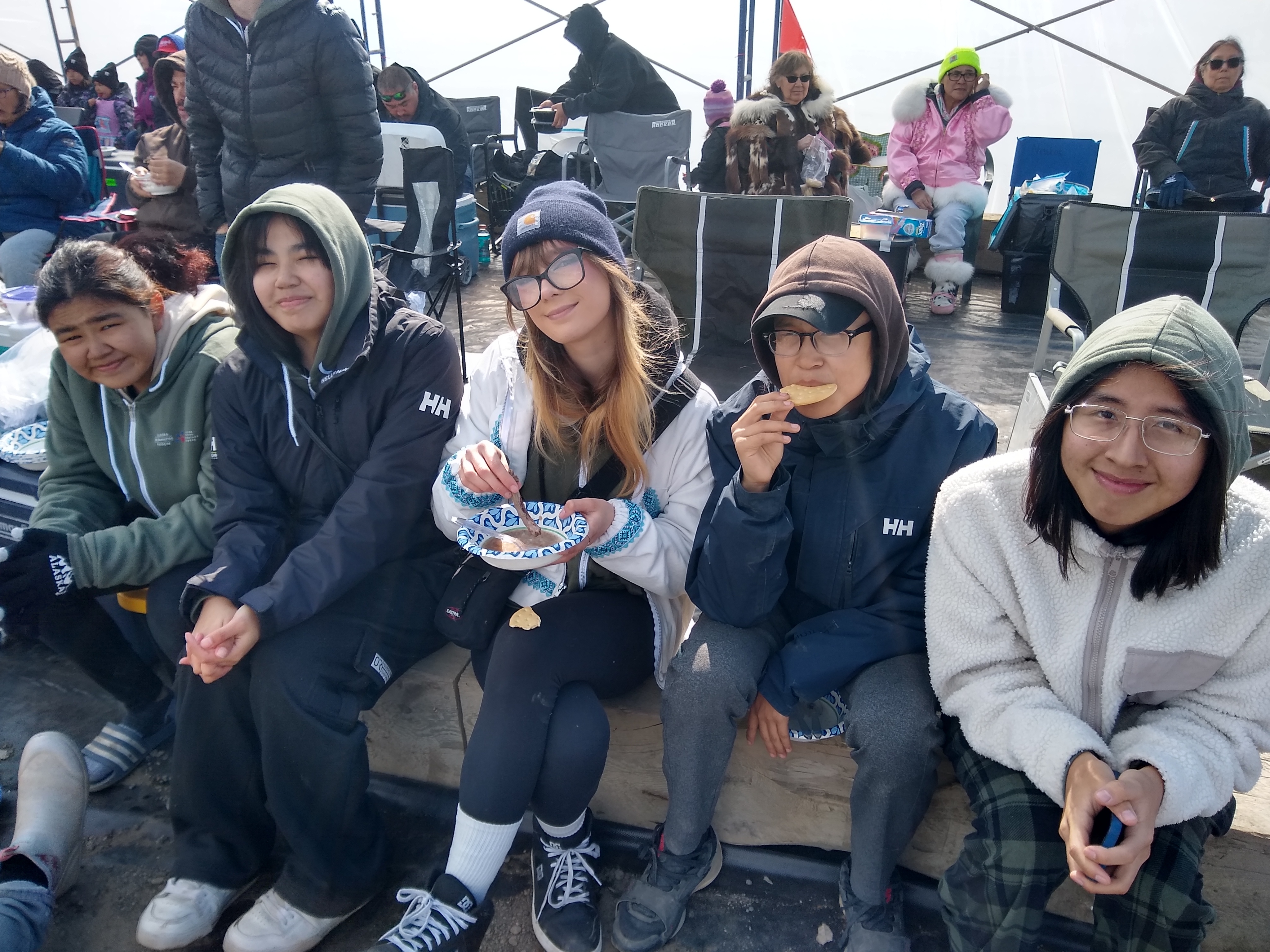
Ilakucaraq students relax with food during Nalukataq festival. Molissa Udevitz
Frieda also connected us with Iñupiaq drummers and brothers David and Vernon Elavgak. They joined our IP students for a few hours one afternoon to share songs and dances from the region. This organically turned into students sharing dances from their home regions with each other, David, and Vernon. Two students even live-streamed the dancing so their mom could watch from home, bringing yet another individual into IP’s web.
The community created around IP extended beyond these Culture Bearers and each student cohort to include other IP participants. Student Faith Brower lives in Utqiaġvik and participated in a different IP cohort. When IP staff told her we were visiting Utqiaġvik, she was excited to join our afternoon of dancing. She shared Iñupiaq dances with the traveling cohort and participated in other group activities, both expanding her IP network and getting to share her home with Native youth. (A notable aside is that Faith was inspired to join her Utqiaġvik dance group after dancing during her IP Anchorage trip. A year later, she was teaching dances to other IP students!)
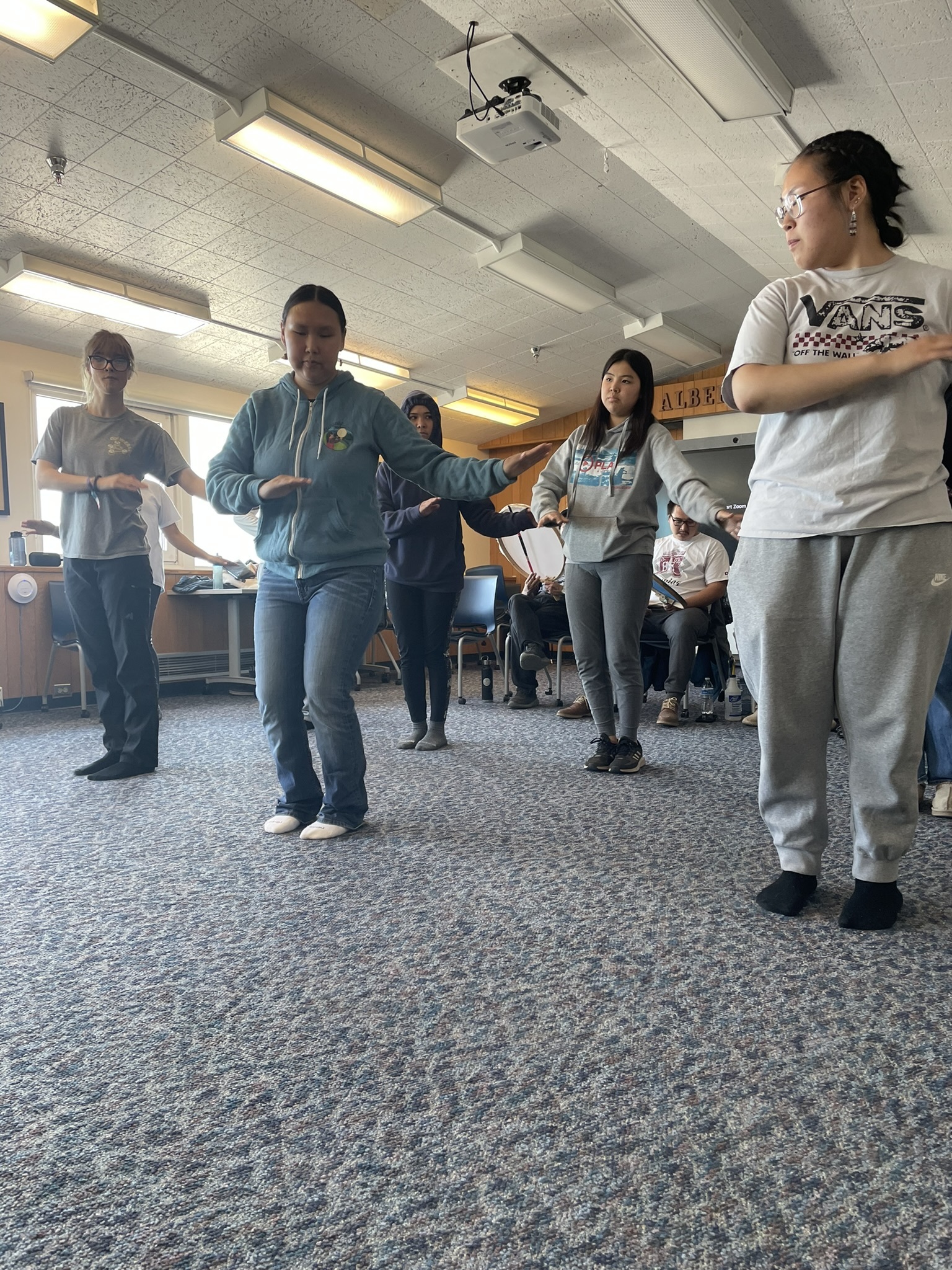
Ilakucaraq student Faith Brower teaches a dance to fellow students. Molissa Udevitz
Another important strand in the web of connections went back to AKHF staff and former Utqiaġvik resident, Kelly. She suggested talking with Rachel Edwardson who then connected us to Qiayaan and Jamie Harcharek. They were incredibly generous with their time over many phone calls, sharing about Iñupiaq culture and what to expect at Nalukataq. Jamie made sure we were prepared for Nalukataq with empty coolers and zip locs so students could bring food home. She also connected us to Laura Patkotak, of the Patkotak whaling crew that hosted the Nalukataq our group attended on our last day in Utqiaġvik. This connection led to our students visiting Laura’s house, and on the morning of Nalukataq, frosting cupcakes and moving supplies to where the event took place. Jamie also spent an afternoon with our group, sharing stories about family, subsistence, traditional tattoos, and teaching students how to make a salve for sore muscles.
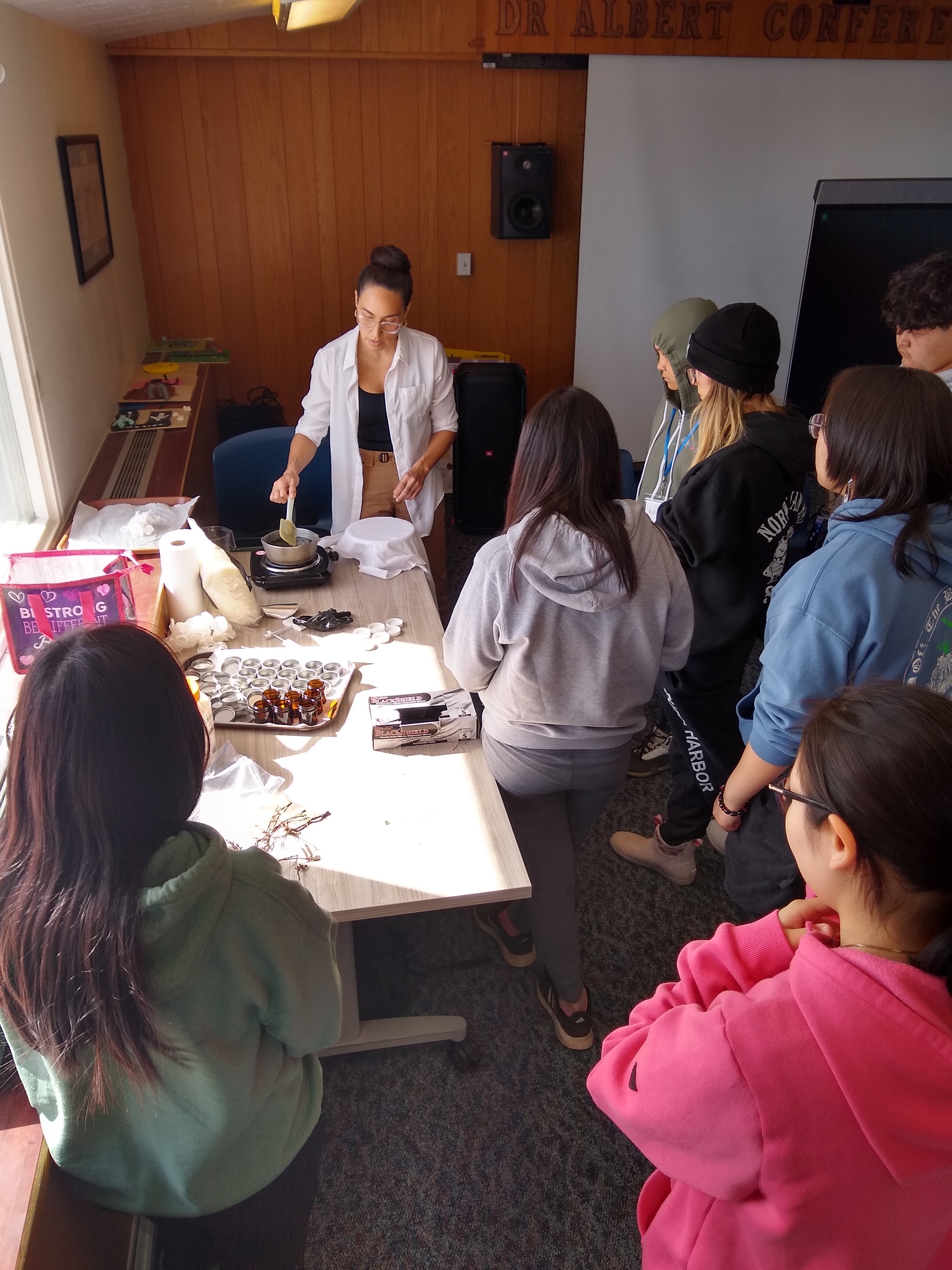
Jamie Harcharek teaches Ilakucaraq students how to make a salve from traditional ingredients. Molissa Udevitz
On our group’s last night in Utqiaġvik, our hosts Jackie and Carl made a beach cookout happen. After cooking hot dogs and s’mores, we all gathered around a smoky campfire for our closing circle. The never-setting sun cast long shadows as students reflected on the week, sharing thoughtful insights like “I learned how well the community of Utqiaġvik is able to come together in such an isolated place” and “My favorite part is connecting with people my age from around Alaska.” When it was Carl’s turn, he shared how special it was to meet and learn from Native youth from other Alaska communities.
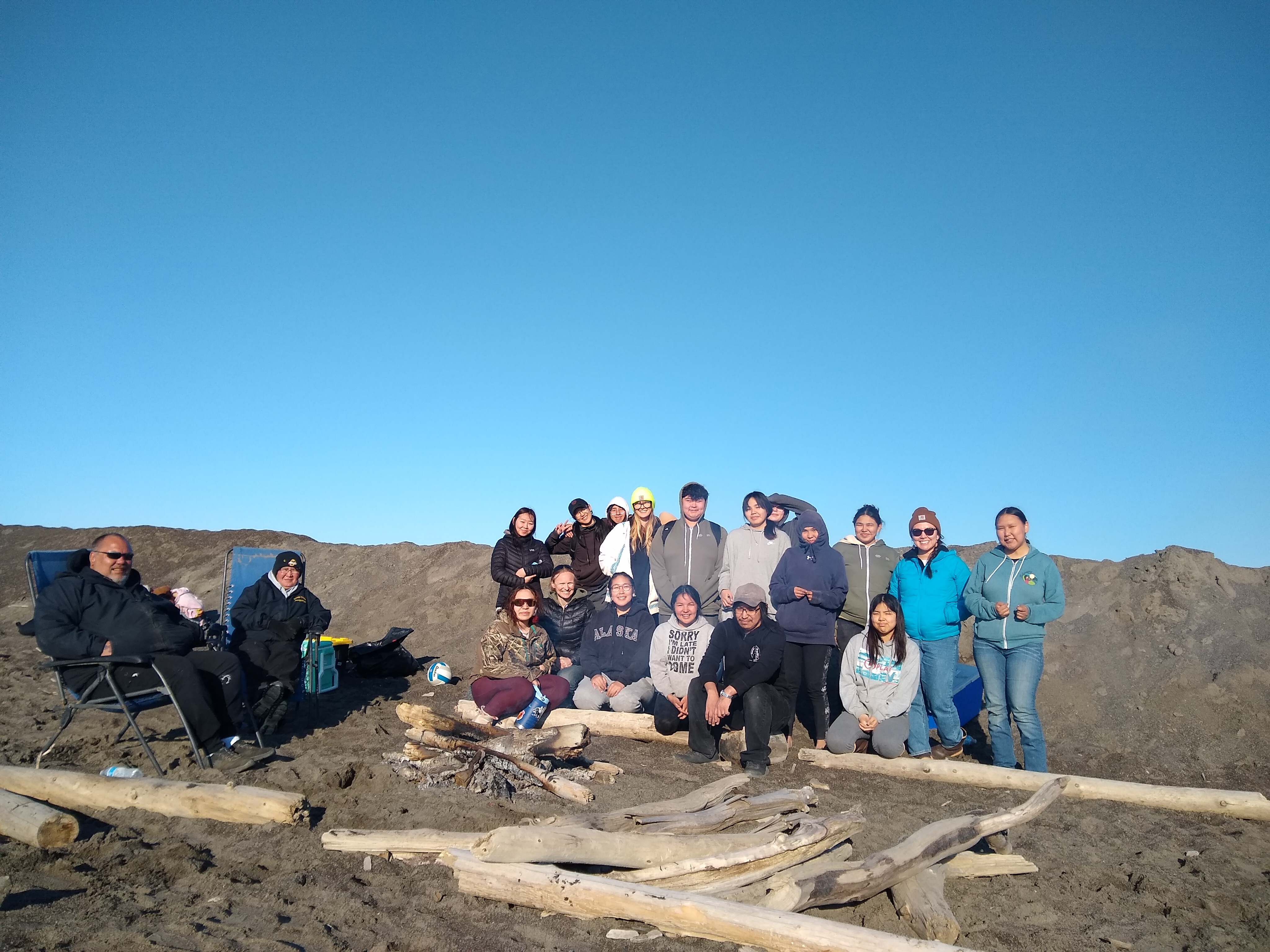
Ilakucaraq students, with Utqiaġvik hosts Jackie and Carl Nayakik, at a beach cookout. Molissa Udevitz
These reflections highlight the extensive community built around IP that spans geographies, ages, and cultures and that cares deeply about Native youth. This community not only includes students and community members but also the many individuals behind the scenes that made these connections possible. Quyanaqpak to everyone. Thank you for supporting Native youth and helping them be proud of who they are and where they come from.
*Space prevented us from including everyone that helped make our Utqiagvik trip special in this blog post, so we want to extend a heartfelt thank you to Amon Barry, Lucy Leavitt, Margaret Olemaun, the Patkotak Crew, Iḷisaġvik and UIC staff, and all the community members who interacted with our group.
The Alaska Humanities Forum is a non-profit, non-partisan organization that designs and facilitates experiences to bridge distance and difference – programming that shares and preserves the stories of people and places across our vast state, and explores what it means to be Alaskan.
November 13, 2025 • MoHagani Magnetek & Polly Carr
November 12, 2025 • Becky Strub
November 10, 2025 • Jim LaBelle, Sr. & Amanda Dale